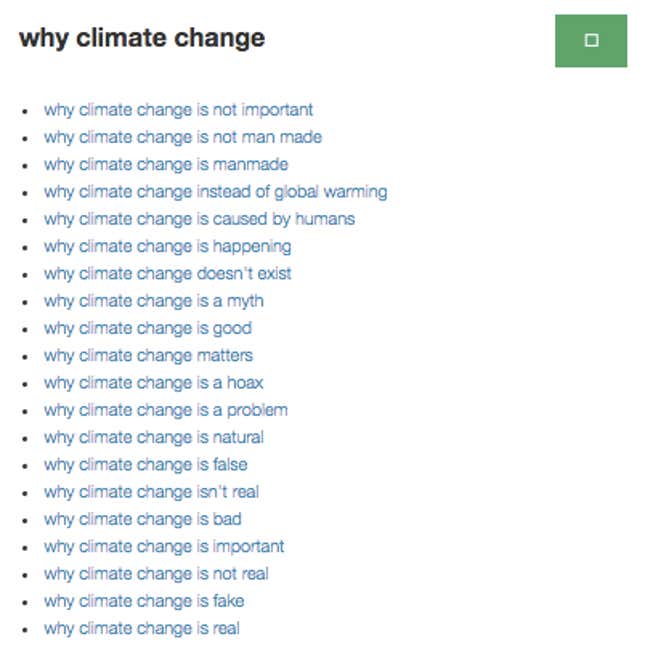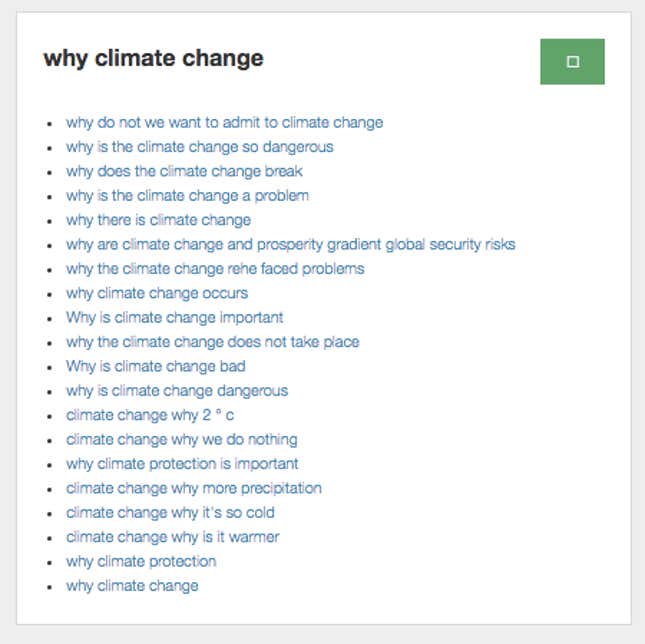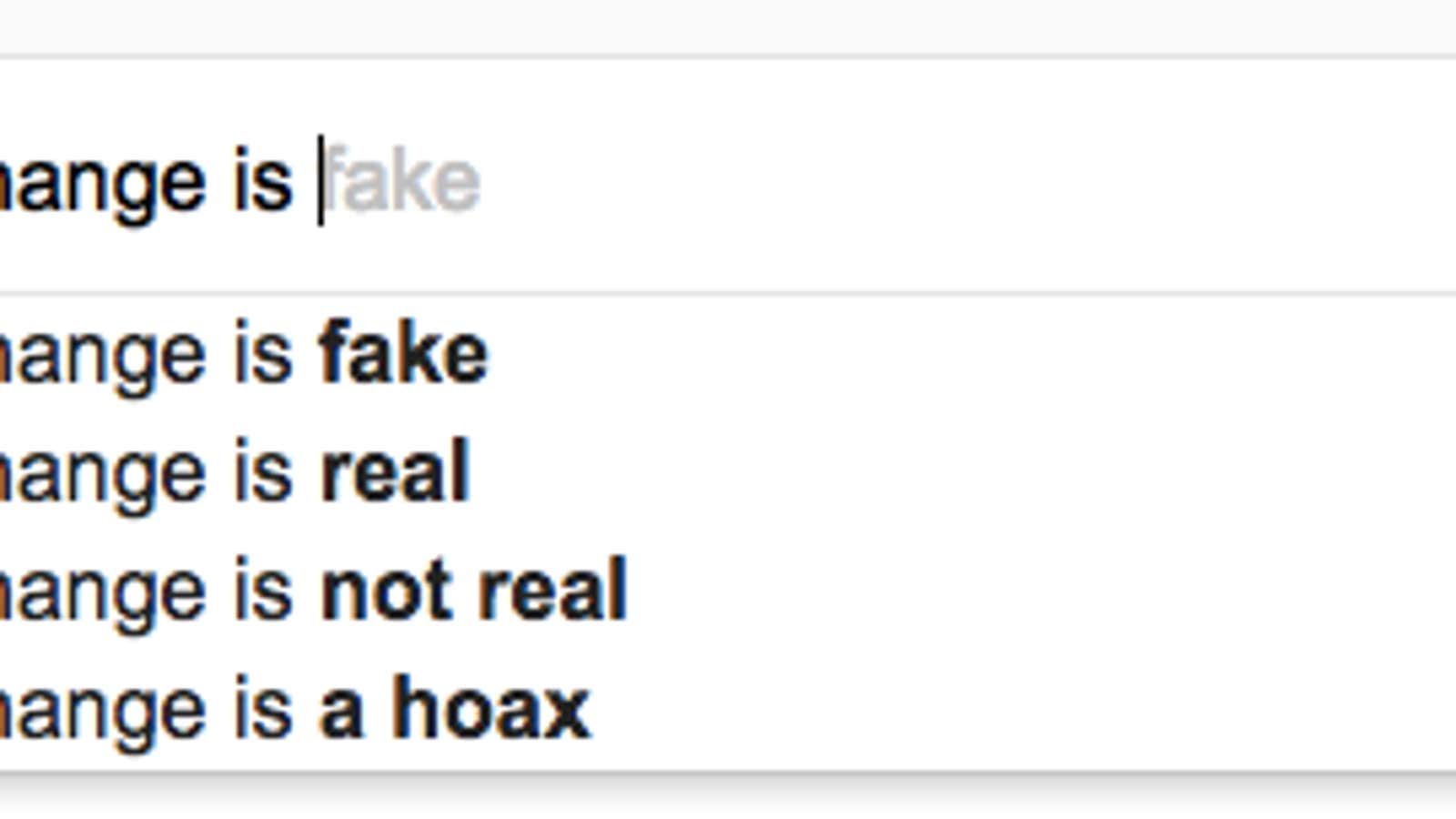Throughout the US’s 2016 election campaign, then-candidate Donald Trump remained ambiguous about his views on the scientific consensus that human activity has contributed to the warming of the planet.
“Nobody really knows,” he said in a Fox News interview. “Look, I’m somebody that gets it, and nobody really knows. It’s not something that’s so hard and fast.” (Which is a reasonable statement if you believe that a consensus among 97% of actively publishing climate scientists equals “nobody really knows.”)
Now, Trump is president and he has pulled the country out of the Paris climate agreement. This action places the US alongside Syria and Nicaragua as the only countries to reject the deal.
Trump’s political calculus on this issue can be understood in the context of public opinion. Though fully half of US adults now believe the planet is warming mostly due to human activity, according to a Gallup poll in March—up on 47% in 2016 and 37% in 2015—the president’s base remains highly skeptical. Only 9% of Republicans share that belief:

This partisan stratification can also be seen in how Americans search for information about the topic online.
We pulled some of the top climate-change queries that people in the US searched for using Google and Bing, according to the Answer the Public website.
Do you have questions about climate change? Tweet at me and I will do my best to get them answered.
Why climate change is a hoax/a myth/not important/not man-made
These, and similar variations, account for a large portion of the “why climate change is…” searches by Americans.
The answers: It is not a myth, it is certainly important, and there is resounding scientific consensus—the aforementioned 97%—that it’s man-made.
From the US government’s 2014 National Climate Assessment:
While scientists continue to refine projections of the future, observations unequivocally show that climate is changing and that the warming of the past 50 years is primarily due to human-induced emissions of heat-trapping gases. These emissions come mainly from burning coal, oil, and gas, with additional contributions from forest clearing and some agricultural practices.
When will climate change happen?
To Americans who wonder when the effects of climate change will begin to emerge, The answer is that it’s already happening.
“What is new over the last decade is that we know with increasing certainty that climate change is happening now,” the 2014 report said.
In 2016 alone, Australia’s Great Barrier Reef suffered the largest loss of corals ever recorded, deforestation in the Amazon escalated, and intense flooding hit Pakistan and parts of the US. Even global coffee production is under threat.
Droughts and rising temperatures connected to climate change left more than 36 million people facing hunger across southern and eastern Africa last year.
“It’s becoming common knowledge now that we will experience droughts much more,” Beatrice Mwangi of World Vision’s southern Africa region told the Guardian. “In the past it was one big drought every 10 years, then it came to one drought every five years, and now the trends are showing that it will be one every three to five years. So we are in a crisis alright, that is true.”
What does climate change mean for the future?
Left unchecked, climate change will bring new extremes to life both in America and across the globe. Sea levels will continue to rise. Ecosystems will disappear. Climate displacement will become more common.
Scientists who testified at a US senate hearing in 2013 warned climate change could wipe out places like New Orleans and Atlantic City, New Jersey.
This roundup from the US government’s 2014 analysis shows the regional change that is already underway across America:
Northeast. Heat waves, heavy downpours and sea level rise pose growing challenges to many aspects of life in the Northeast. Infrastructure, agriculture, fisheries and ecosystems will be increasingly compromised. Many states and cities are beginning to incorporate climate change into their planning.
Northwest. Changes in the timing of streamflow reduce water supplies for competing demands. Sea level rise, erosion, inundation, risks to infrastructure and increasing ocean acidity pose major threats. Increasing wildfire, insect outbreaks and tree diseases are causing widespread tree die-off.
Southeast. Sea level rise poses widespread and continuing threats to the region’s economy and environment. Extreme heat will affect health, energy, agriculture and more. Decreased water availability will have economic and environmental impacts.
Midwest. Extreme heat, heavy downpours and flooding will affect infrastructure, health, agriculture, forestry, transportation, air and water quality, and more. Climate change will also exacerbate a range of risks to the Great Lakes.
Southwest. Increased heat, drought and insect outbreaks, all linked to climate change, have increased wildfires. Declining water supplies, reduced agricultural yields, health impacts in cities due to heat, and flooding and erosion in coastal areas are additional concerns.
The takeaway?

The prevalence of these queries in internet searches in the US underscores how the doubt created by partisan denials of climate change has convinced many Americans that global warming is at worst a hoax, or at least an unavoidable trend in weather patterns that won’t affect their lives.
In other parts of the world, the public seems to be living in a completely different universe. Consider one of Germany’s top searched queries on the subject: der Klimawandel ist die wichtigste globale Herausforderung unserer Zeit. “Climate change is the biggest global challenge of our time.”
Read next: There is still time to reverse some of the worst effects of global warming
